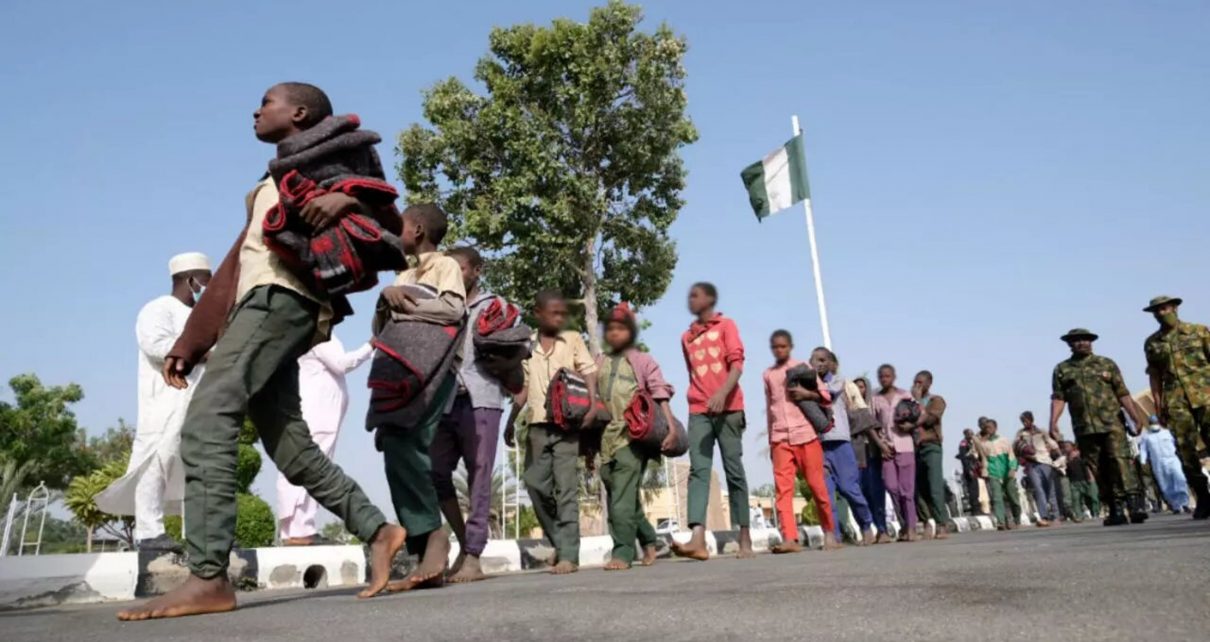
Mohammed Babagana Monguno, Nigeria’s National Security Adviser, usually doesn’t hug the klieg lights. In the face of the unprecedented spate of kidnappings, armed banditry and other threats to society, however, the retired army general recently spoke in unmistakable terms which many analysts have interpreted as signalling the much desired no-nonsense phase of the war against the many variants of terror stalking the land.
“There are individuals in this country who have assumed the status that is beyond what they should be”, Monguno declared… I am sending a warning to anybody who is hiding beneath the veneer of some status, whether in terms of official capacity or traditional or religious to stoke flames of disorder, will have himself to blame.”
A former Chief of Defence Intelligence, Monguno served notice that there would be no sacred cows: “The government is very, very serious about this anarchy. But I want to stress once more that any individual or group that thinks it can take it upon itself to cause disunity, disharmony and to render this country, push the country to the brink should have a rethink… any one person who thinks … he can lead us into a situation of unhappiness will have himself to blame at the end of the day.
Many state and non-state actors have alleged that some prominent persons are the unseen hands stoking the fire of insecurity in the country. The public has always responded by asking, “So what? Arrest them!” With the advent on new service chiefs and a seeming return to normalcy in the established line of relationship between them and the NSA, perhaps a new era of coordinated response to lurking threats is here?
Governor of Zamfara State, Bello Matawalle, once offered to resign if that would bring insecurity to and end in his state. He alleged that some of the most unlikely people were colluding with criminals to make the state ungovernable. Some Obas in Ogun State had earlier on alleged that some people in military uniform were aiding the bandits tormenting their area. Also, during the abduction of some persons and school children in Niger State, eyewitnesses had revealed that the kidnappers came in military uniform. Similarly, some of the 300 schoolgirls abducted in Jangebe said that their abductors were dressed in military uniform.
Well, what does one know! The recent apprehension of a soldier and his girlfriend in Zamfara for assisting bandits with military uniforms and ammunition in active connivance with other saboteurs, left many eyes popping. According to the Deputy Chief of Staff to the governor, Dr Bashir Muhammad Maru, the arrest was made possible through community-driven intelligence. He noted that the incident confirmed the state government’s position that there were bad eggs in the military. Until the system was cleared of the bad eggs, he warned, it would be difficult to defeat banditry in Zamfara State.
Military strategists have always advocated the pursuit of non-kinetic warfare strategy in order to consolidate the military’s gains in the counter-insurgency operations. In April 2016, Pakistan’s High Commissioner to Nigeria, Lt-Gen Agha Farooq (rtd), delivered a lecture on “Non-Kinetic Warfare and National Security” at the National Defence College in which he warned that, “counter-insurgency is difficult even for the best military; it requires remarkable military skills which must be backed by strong political decisions.”
It might do us some good to remember Gen Farooq’s counsel:
“The advice I can give to Nigeria is to adopt this non-kinetic warfare strategy; Nigeria has some elements of national power and every other ingredient to become a better society in adopting this approach… Nigeria must focus on the other approach that takes care of the needs of society… terrorism is a disease, a cancer and a way by some individuals to achieve their objectives. It is an embarrassment strategy and anybody can adopt this strategy to embarrass a nation he or she is in conflict with. Today, Pakistan has sufficiently addressed its challenge by first addressing the root causes of terrorism and secondly by engaging different segments of its population that does not believe in terrorism.”
Nigeria must focus on the other approach that takes care of the needs of society… terrorism is a disease, a cancer and a way by some individuals to achieve their objectives. It is an embarrassment strategy and anybody can adopt this strategy to embarrass a nation he or she is in conflict with.
Lt-Gen Agha Farooq (rtd) – Pakistani High Commissioner to Nigeria
Farooq’s point was brilliantly domesticated by Rear Admiral Samuel Alade whose deep analysis continues to ring loud: “For a soldier to win a war, that soldier must be a fighter, a politician and a social worker.”
The arrest of the soldier in Zamfara proves the point. To defeat terror, security operatives must partner with the people.
Applying the hammer to the backside of terrorists and their sympathisers is the other side of the coin. Whereas some apologists of terrorism have been hiding under various masks, government may no longer dismiss them as mere irritants. That is the import of Gen Monguno’s outburst. That is how other countries rein in all merchants and acolytes of terror (Boko Haram, kidnappers, bandits, armed gangs) rather than romancing them.
In Egypt, individuals joining terrorist organisations would be punished with imprisonment. If they received any military training by those organisations, the prison term will be a minimum of ten years.
In France, the crime of “participating in a group formed, or an agreement made, for the purpose of preparing” an act of terrorism is punishable by up to ten years imprisonment and a fine of €225,000 (approximately US$ 281,600).
In Ghana, a person brought on charges of supporting a terrorist act may, on conviction, be liable to a penalty ranging from seven to twenty-five years in prison.
India, the Unlawful Activities (Prevention) Act punishes terrorist activities in India or any foreign country and also criminalises funding, membership, and support of designated terrorist organisations.
In Italy, anyone who promotes, establishes, organises, directs or finances associations whose purpose is to carry out acts of violence with the purpose of terrorism or subversion of the democratic order is punished by imprisonment from seven to fifteen years. Anyone participating in such associations will be jailed for five to ten years.
In Oman, If a terrorist act occurred in the country as a result of collaboration between a citizen and a terrorist organisation, the punishment is death.
In Saudi Arabia, offenders face terms of imprisonment ranging from three to twenty years for (a) joining extremist organisations; (b) participating in military operations abroad with such organisations; and (c) supporting those organisations materially or through recruiting others.
In South Africa, a citizen or resident who engages in terrorist activities or is affiliated with a terrorist organisation abroad may be prosecuted in South Africa for the crime of terrorist activities or for committing offences associated with terrorist activities.
In the United Kingdom, it is a criminal offence for any British national to obtain training in terrorism, and suspects may be prosecuted in the UK for other acts of terrorism, even if the acts are committed overseas. The British Nationality Act permits the Secretary of State to deprive a guilty person of his/her British citizenship, unless it would render him/her stateless.
In Uzbekistan, President Islam Karimov has reportedly warned citizens who have left the country to join Islamic extremist groups and train at terrorist camps that if they return home, they will go to prison for a term of five to seven years. Inside Uzbekistan, individuals who know about potential terrorist activities and do not inform the authorities are also being sent to prison.
There is nowhere in the world where terrorists are romanced and pampered.
In Nigeria the law authorises the president to declare a person a “Suspected International Terrorist” (SIT) if he reasonably suspects that the person in question is currently or was in the past involved in acts of international terrorism, is currently affiliated with an international terrorist group, or has links to an international terrorist group and therefore is a risk to Nigeria’s national security. If the person in question is affiliated with an international terrorist group, he/she may be charged and, on conviction, sentenced to a maximum twenty-year jail term.
It is befuddling that with all these fine provisions empowering the president, some Nigerian terrorists will still be strutting all over Sambisa Forest under the flag of Islamic State of West Africa, ISWA, an acronym that used to define the International Solid Waste Association before religious extremists took the stage.
While it is desirable — indeed, imperative — that the underlying problems of poverty, illiteracy, social dislocation that predispose young people to terrorism are addressed, there can be no pussyfooting about applying the hammer to the terrorists and their allies, no matter how maze-like their subterfuge.
- Wole Olaoye is a public relations practitioner and a public affairs commentator and can be reached at wole.olaoye@gmail.com


